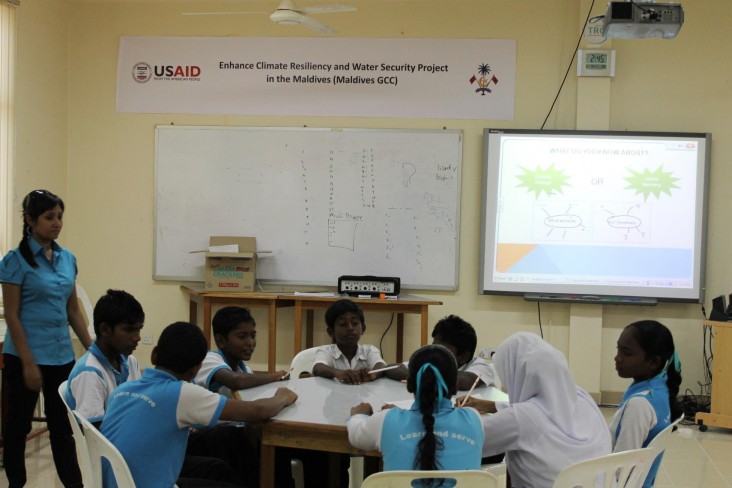Speeches Shim

Coral reef ecosystems are essential for sustainable oceans. Not only do they support major fisheries, they also buffer shorelines against waves, storms and floods, helping to prevent loss of life, property damage and land erosion. Yet, coral reefs are particularly vulnerable to the effects of climate change, including sea level rise, warmer sea temperatures, and ocean acidification.
USAID is strengthening the management of coral reef ecosystems to mitigate the adverse effects of climate change in Maldives. USAID trained 650 volunteer marine biologists between 2014 and 2016 on best practices to monitor marine biodiversity. These “citizen-scientists” help raise awareness and implement much-needed climate impact mitigation and management measures. USAID has also sponsored a series of public seminars on environment at the Maldives National University. More than 6,000 people have attended these seminars. We are also helping the Maldivian Government achieve its goal of being designated a UNESCO Biosphere Reserve–an international recognition that will help boost conservation efforts.
To address the issue of decreasing potable water, the Maldives GCC project constructed an integrated water supply and distribution system on Hinnavaru Island, providing reliable access to safe drinking water for the island’s 4,500 residents (700 households). The integrated water supply and distribution system is part of USAID’s strategy to enhance water security, and build the national and local capacity of government utilities. USAID provided technical assistance and capacity building to help regulators make informed decisions around water resource management, and to develop the knowledge, skills, and attitudes that island residents need to become good stewards of their island environment. The system is fully operational, and is being sustainably operated and maintained by the national Maldivian water utility.
Reefs Generate Environmental and Economic Resiliency for Atoll Ecosystems (REGENERATE)
The REGENERATE project strengthens the management of coral reef ecosystems to mitigate the adverse effects of climate change in Maldives. The four objectives of REGENERATE are to: (1) improve access to science and technology for decision making and establish policy frameworks for increasing coastal resilience; (2) increase stakeholder capacity to measure, monitor and adapt to climate stresses through education, training and outreach; (3) strengthen governance in support of decentralized management for more resilient reef ecosystems; and (4) establish sustainable financing mechanisms to support climate-resilient marine management.
Public Financial Management in Maldives
This activity will strengthen government capacity and systems to implement transparent budget management, efficient public investment, and mobilize public revenue for better public expenditure management.


Comment
Make a general inquiry or suggest an improvement.